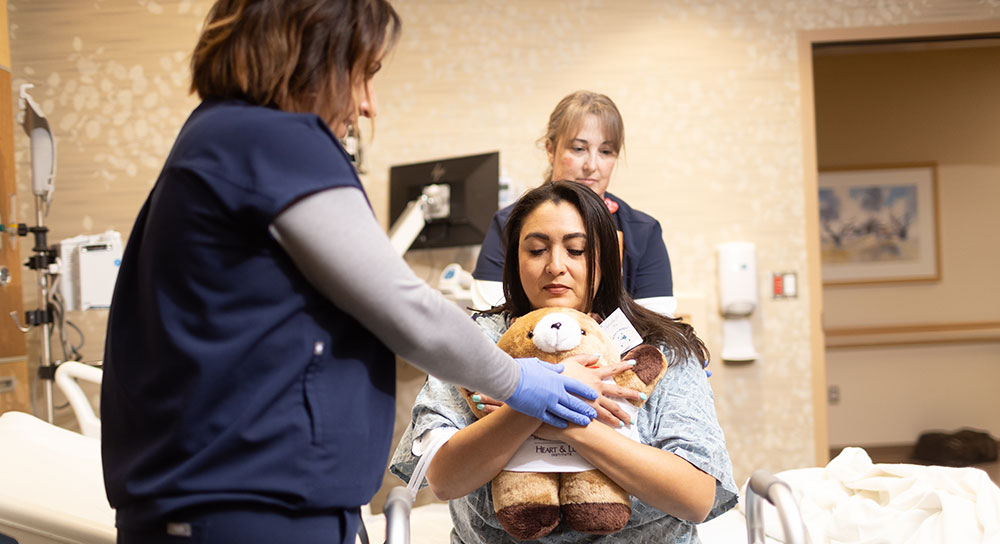 It’s been a few months since Carl Booker’s cath lab procedure was filmed by nationally-syndicated reality TV show Healthcare Heroes. Dr. Bipin Joshi performed the catheter procedure in September to help Booker’s congestive heart failure. Now Booker is able to get around better and is doing well.
It’s been a few months since Carl Booker’s cath lab procedure was filmed by nationally-syndicated reality TV show Healthcare Heroes. Dr. Bipin Joshi performed the catheter procedure in September to help Booker’s congestive heart failure. Now Booker is able to get around better and is doing well.
To learn more about how to live with congestive heart failure, read on:
Sylvia Rodriguez knew something was wrong when she couldn’t take a walk without losing her breath.
“I would tell the doctor I couldn’t walk a block when I already felt very exhausted,” Rodriguez said.
With the help of her granddaughter Ashley, Rodriquez turned to the heart failure program at Community Regional Medical Center for answers.
Congestive heart failure is one of the leading causes of hospitalization and emergency room re-admission. But through Community’s heart failure program, patients are educated to take better care of themselves and learn to manage their disease and medications while making healthier lifestyle choices.
Heart failure is a condition where the heart can’t pump enough blood to the body’s other organs.
Most people pump out 50% or more of the blood that goes into the heart. These patients pump out less than 40% of the blood.
Irene Sanchez, lead cardiology nurse for the Heart Institute at Community Regional says signs of heart failure include shortness of breath, inability to sleep flat and swelling of the ankles or legs.
Sanchez says most of her patients come up short of breath in just a few steps.
“You ask them, ‘Can you walk to the bathroom in the morning without getting short of breath?’” she says. “If the patient says, ‘No, I can’t even go to the bathroom. I can’t even go to the kitchen without getting short of breath,’ that’s a sign the patient is probably retaining fluid and the heart is starting to pump less. That’s a big sign.”
Dr. Ralph Wessel, cardiologist for the congestive heart failure program says educating patients is key to keeping them out of emergency rooms.
“This type of program significantly reduces the number of admissions for patients with congestive heart failure,” he said.
Research indicates chronic disease management, giving patients easy access to the health care system and familiarity with the provider helps congestive heart failure patients. By educating the patient and helping with medications, rather than going to the emergency room, patients are less likely to be hospitalized down the road, Dr. Wessel said.
“We can help patients and also help the finances of the medical system by reducing hospitalization, reducing medical costs, as well as making the patients feel better and live longer,” Dr. Wessel said. “Patients learn how to deal and adapt with their disease, so they’re more comfortable and they have a better quality of life as well as a longer life.”
Sanchez said, “We’re going to educate them on medication. We want to educate them on a low-sodium diet. What not to eat, what to eat. I’d like to see less patients coming in through the emergency room with heart failure and more taking advantage of the program.”
Rodriguez says she is thankful for Community’s heart failure program, because it has made it possible for her to keep pace with her grandchildren.
“Now that I have medicine and everything, I can walk a little farther.”
This story was reported by Mary Lisa Russell. She can be reached at mrussell@communitymedical.org.


 It’s been a few months since Carl Booker’s cath lab procedure was filmed by nationally-syndicated reality TV show Healthcare Heroes. Dr. Bipin Joshi performed the catheter procedure in September to help Booker’s congestive heart failure. Now Booker is able to get around better and is doing well.
It’s been a few months since Carl Booker’s cath lab procedure was filmed by nationally-syndicated reality TV show Healthcare Heroes. Dr. Bipin Joshi performed the catheter procedure in September to help Booker’s congestive heart failure. Now Booker is able to get around better and is doing well.

.jpg)
